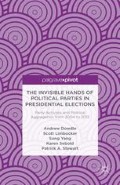Abstract
By all traditional measures, Mitt Romney should have sailed to the Republican nomination with little opposition. However, the race was not a smooth path, and it was evident that the network of preprimary donors was fragmented. While Romney won the nomination as predicted, he shared fewer donors than almost any major candidate in recent history. This shortcoming was not limited to Romney, as the entire party was divided. The Republicans were split into three groups: a mainstream wing populated by Romney, Perry and Huntsman; a Tea Party grouping of Bachman, Cain and Gingrich; and a libertarian cluster around Paul and Johnson. This fractured picture in 2012 closely mirrored the splits within the party four years earlier.
Access this chapter
Tax calculation will be finalised at checkout
Purchases are for personal use only
Preview
Unable to display preview. Download preview PDF.
Notes
John Sides and Lynn Vavreck, The Gamble: The Hand You’re Dealt (Princeton, NJ: Princeton University, 2012). Ebook.
John Sides and Lynn Vavreck, The Gamble: Random or Romney (Princeton, NJ: Princeton University, 2012). Ebook.
David Kirby and David Bowass, “The Libertarian Vote in the Age of Obama,” Policy Analysis 658 (2010): 1–20.
Gary Langer, “New Lows Among Conservatives Mark Romney’s Popularity Problem,” ABCNews.Com, February 28, 2012, http://abcnews.go.com/blogs/ politics/2012/02/new-lows-among-conservatives-mark-romneys-popularityproblem/ (accessed March 10, 2013).
For the best explanation of the impact of the Tea Party Movement on the Republican Party, see Michael A. Bailey, Jonathan Mummolo, and Hans Noel, “Tea Party Influence: A Story of Activists and Elites,” American Politics Research 40 (2012): 769–804.
Author information
Authors and Affiliations
Copyright information
© 2013 Andrew Dowdle, Scott Limbocker, Song Yang, Karen Sebold, and Patrick A. Stewart
About this chapter
Cite this chapter
Dowdle, A., Limbocker, S., Yang, S., Sebold, K., Stewart, P.A. (2013). A “Not-Romney” Explanation: The 2012 Republican Nomination Process. In: The Invisible Hands of Political Parties in Presidential Elections: Party Activists and Political Aggregation from 2004 to 2012. Palgrave Pivot, New York. https://doi.org/10.1057/9781137318602_6
Download citation
DOI: https://doi.org/10.1057/9781137318602_6
Publisher Name: Palgrave Pivot, New York
Print ISBN: 978-1-349-45857-8
Online ISBN: 978-1-137-31860-2
eBook Packages: Palgrave Political & Intern. Studies CollectionPolitical Science and International Studies (R0)

